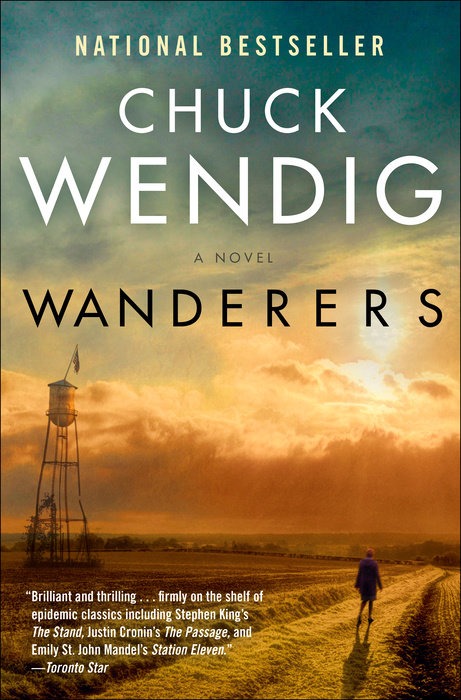Wanderers spins a tale of modern Armageddon, complete with mysterious diseases, zealots, and an AI system that may not be what it seems.
There’s a LOT going on in Wanderers. Clocking in at nearly 800 pages, Chuck Wendig’s latest novel is pretty hefty while going through a number of twists and turns. As such, it’s kinda tough to summarize, but let me break down the basics of what to expect (without spoilers).
Wanderers
Written By: Chuck Wendig
Published By: Random House
Release Date: July 2, 2019
Purchase [Affiliate]: https://amzn.to/3tpl3Dx
Something strange is going on in America. Without warning, or explanation, people are getting up and sleepwalking. This isn’t ordinary sleepwalking, however, as any attempts to wake them has violent results. They form an ever growing herd walking forward across the country, with new walkers joining the “flock” every few hours with no discernible pattern, people are understandably scared.
Benji Ray, a former CDC doctor who worked as a sort of “disease detective” finds himself involved in the mystery at the behest of Black Swan an artificial intelligence that thinks he can help. Yep, that’s right an AI. Black Swan was created by a branch of the CDC as a predictive tool that could help identify points of outbreaks BEFORE they happened. Thus allowing the CDC to swoop in and help before things turned into a pandemic.
Benji, understandably, has a great deal of suspicion regarding Black Swan, but the mystery of the sleepwalker epidemic is too great for him to shrug off. Along Sadie (Black Swan’s architect/handler) and a team from the CDC he begins investigating. Things only get stranger, however, as they quickly learn that whatever’s affecting the walkers is far from natural.
Sharp objects (including needles) can no longer pierce their skin, they do not eat or drink, and they do not rest. All they do is move forward towards a destination only they know. Hell, they don’t even go to the restroom anymore!
As the flock grows, so too do the shepherds who tend them. These are family members/loved ones who stick with the walkers on their strange journey. Along the way other followers (including an aging rockstar) join the procession for reasons of their own.
While the sleepwalkers are a weird phenomena, that’s not the only strangeness going on. The country is in the middle of Presidential election season and the politicians on both sides have latched onto the sleepwalkers as an important rallying point. Certain nefarious groups (i.e. white supremacists) see them as a chance to seize control and use fear to drive their point home.
Even as Benji and the shepherds try to figure out/protect the flock, there are others in the country working to destroy them and all they (potentially) represent. While the world begins tearing itself apart, the walkers plod ever onward, unceasing in their journey. But as that mystery continues to deepen, Black Swan alerts Benji and his CDC team to a new, and deadly, disease that’s already gained a foothold around the globe. But is Black Swan really on their side, or working towards its own goals?
Character and Pacing
Like I said, there’s a LOT going on within the story and just when you think you’ve got a handle on where it’s going, it takes a sudden turn. Wanderers goes from science fiction thriller, to survival adventure, to medical drama, and apocalyptic action. On the whole, this approach made for one wild ride that kept me on the “edge of my seat” so to speak.
It does, however, reach a point where it feels like TOO much is going on. Even in the last 100 pages, there are some big shifts in the story. This isn’t necessarily a bad thing, but caused some pacing issues that made it harder to connect to the characters on the backend. At that point I was ready to see how the journey ended rather than be thrown another twist to think about.
Even so, there’s no denying that I was hooked into the story almost instantly. Wendig does an excellent job feeding you interesting tidbits of information, with genuinely engaging characters right off the bat. Within just the first few chapters, I was sucked in.
Despite its length, Wanderers doesn’t feel long. I know that sounds strange, but the writing makes for a quick read. While it’s lengthy, the prose doesn’t waste time either. There’s not a lot of exposition dumps that slow you down. Instead, the characters and dialog really pull the story along and give you everything you need to know what’s going on (though it’s often limited to what the characters know, which isn’t much).
The writing style makes it easy to read and coupled with the characters and mystery, I found myself unable to put it down. I felt compelled to keep going, getting to the next point where some manner of revelation offered up new clues as to what was going on. It wastes little time, grabbing you by the hand and pulling you along at a breakneck pace until you’ve turned the final page.
In some ways this makes the story feel a bit disjointed at times, as it jumps from one thing to another. While everything eventually makes connections, some of the transitions are a bit jarring. What’s impressive, however, is that even in these moments, I never felt bored.
Oftentimes with large books of this sort, with a large roster of characters, when books make a sudden jump to new characters, I find myself anxious to go back to the characters I’ve been following. This wasn’t the case in Wanderers. Even with the huge cast of characters I found myself genuinely attached to all of them and excited to see what they were doing next.
Among these are Shana, the sister to the first sleepwalker, who’s dogged determination to keep her sister safe helps drive the story forward and serves as readers’ empathetic entry point. While Benji takes up a good chunk of the story and forms the other side of the story, his status as uber smart disease detective doesn’t exactly make him as relatable. Instead, Shana’s distrusting, sarcastic, and confused outlook on the events provide the perfect perspective for readers to latch onto.
Overall, between the characters and general pacing of the book, Wanderers makes for fast reading. You won’t want to put it down, though there are plenty of good resting points when you need to.
New World Apocalypse
The more I’ve thought about it, one of my favorite elements of Wanderers is how Wendig managed to incorporate the modern world into an end of the world story. Each chapter starts with an epigraph that either provides pertinent info or more philosophical setups for the chapter ahead. A lot of these take the form of social media posts (Tumblr, Twitter, Instagram, even podcast snippets) which gives a glimpse into how these apocalyptic events would be conveyed around the world.
There are Twitter bots specifically to count the sleepwalkers as they travel, online conspiracies about it all, and even calls to action/hashtags dedicated to the events. While some of that brought a chuckle, it feels incredibly realistic and about what you’d expect to see online in the early days of terrifying outbreaks. It brought an interesting, and surprisingly, grounding element to the story.
Even as things got a bit more fantastical, those snippets offered a real-world perspective that kept me from being pulled out of the experience. It seems like a simple inclusion, but it’s an aspect of the modern world that I haven’t really seen utilized in these kind of stories (books, movies, etc.). Sure, most these days involve something with smartphones and how the grid goes down, but they don’t delve into the smaller details like Wanderers does.
A Product of Its Time
While I loved how the book delivered on a very modern take on this kind of story, the other side of that coin forms one of the (admittedly few) problems I have with Wanderers. It’s almost too rooted in our current window of time, with direct references to technology, software, and pop culture that’s specifically within our world today.
As such, there were several instances where I found myself wondering about the lasting power of the book. In just 10 years, will the social media sites used in the story even be relevant? Moreso, will anyone remember the intricacies of how those sites work to understand the references being used? For now, it makes for a very realistic and engaging modern story about the end of the world, but certain things make me wonder about it’s re-readability aspect…
Themes and Landings
If you can’t tell by now…I really enjoyed Wanderers. It feels like a solid mix of Michael Crichton science thriller, with the character beats of Stephen King. It manages to feel smart and engaging, even when the story drags a bit. The only thing it seems to lack, however, is subtlety. The themes and ideas within the novel are super important, and the novel wears them on its sleeve.
This isn’t necessarily a bad thing (sometimes being blunt is for the best when it comes to certain topics) but at points does come off a bit heavy handed. Like using a sledgehammer to drive picture frame nail into the wall. Again, for the most part, I enjoyed the topical nature of the themes and the scary realism it has (remember kids, Nazis are always bad) but I think a lighter touch during some moments would have elevated it.
The only other niggling issue I have with Wanderers is how some of the character arcs land. I really don’t want to get into spoilers, but suffice it to say that some people die, some people live, and some just kinda disappear without further mention. While I enjoyed how the story wrapped up overall, some of the character plots just petered out and the majority of the deaths felt…hollow. It’s strange, considering how well Wendig does in getting me attached to characters quickly, yet I found little investment in how they “ended.”





